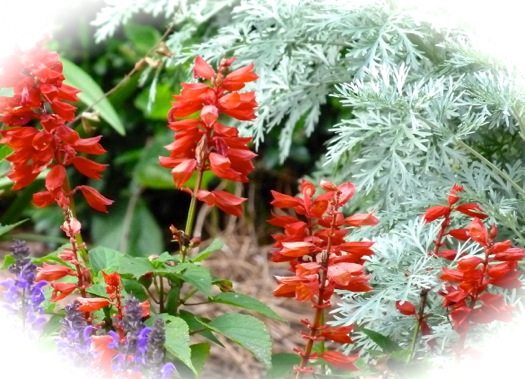I tend to have a deep green summer. Except for tropicals, which are grown as annuals here, not many flowers tolerate the high heat and humidity of my summer climate. However, back in April I planted two different types of salvias, and they have both bloomed non-stop with little help from me. I have other types of salvias, but none have the almost continuous bloom I have seen from these. And the great news is that they should both continue blooming till frost. I am also pleased that they are attractive to butterflies, bees and hummingbirds. They look great in the border, and they also do well in containers.
First, is Salvia splendens 'Saucy Red.'  It features scarlet red blooms on a compact plant from April to November. The heart shaped, evergreen foliage has a neat habit, and the flower spikes are self-cleaning.
It features scarlet red blooms on a compact plant from April to November. The heart shaped, evergreen foliage has a neat habit, and the flower spikes are self-cleaning. There is no need to dead-head, though dead-heading will promote new growth. The seeds are sterile. The plant can reach up to 2-3 feet tall x 2-3 feet wide. It is not fussy about soil type, and it needs a moderate amount of water. If grown in a pot, it requires well-draining soil. It should be planted in full sun to part shade. Although Salvia splendens is usually considered a tender perennial at best, this one is said to have a maximum cold tolerance of 0 degrees Fahrenheit (- 18 centigrade).
There is no need to dead-head, though dead-heading will promote new growth. The seeds are sterile. The plant can reach up to 2-3 feet tall x 2-3 feet wide. It is not fussy about soil type, and it needs a moderate amount of water. If grown in a pot, it requires well-draining soil. It should be planted in full sun to part shade. Although Salvia splendens is usually considered a tender perennial at best, this one is said to have a maximum cold tolerance of 0 degrees Fahrenheit (- 18 centigrade).
Another salvia that has been a highlight in my garden this year is Salvia 'Amistad.' Everyone who sees it remarks about its beauty. Thought to have Salvia guarantica and possibly Salvia mexicana parentage, its exact origins are unknown. Originally from Mexico, the name means "friendship." It has amazing velvet purple blooms from spring till frost.
Originally from Mexico, the name means "friendship." It has amazing velvet purple blooms from spring till frost. It likes full sun and well-drained garden soil. It has deciduous foliage, and I have seen reports of winter temperature tolerance from around 10 to 18 degrees Fahrenheit (-12 to -8 centigrade). If I have a severe winter, I may not see it come back next spring, but even if not, it has earned its keep in my garden this year. A semi-shrub, it can reach 3-4 feet tall x 3 feet wide. Prune when new growth begins in spring. If desired, prune again in mid-season to control growth.
It likes full sun and well-drained garden soil. It has deciduous foliage, and I have seen reports of winter temperature tolerance from around 10 to 18 degrees Fahrenheit (-12 to -8 centigrade). If I have a severe winter, I may not see it come back next spring, but even if not, it has earned its keep in my garden this year. A semi-shrub, it can reach 3-4 feet tall x 3 feet wide. Prune when new growth begins in spring. If desired, prune again in mid-season to control growth.
Both salvias should be fertilized with a slow release fertilizer in spring and then mulched.